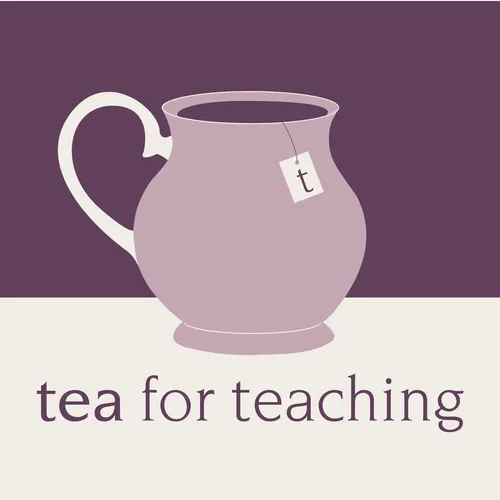
Tea for Teaching
An informal discussion of innovative and effective practices in teaching and learning. This podcast series is hosted by John Kane (an economist) and Rebecca Mushtare (a graphic designer). This podcast is produced by the Center for Excellence in Learning and Teaching at SUNY Oswego.
- Update frequency
- every 7 days
- Average duration
- 38 minutes
- Episodes
- 411
- Years Active
- 2017 - 2025

Adaptive Learning
Do your students arrive in your classes with diverse educational backgrounds? Does a one-size-fits-all instructional strategy leave some students struggling and others bored? Charles Dziuban joins us…

Learning about learning
Learning is hard work. The most commonly used study techniques often provoke the illusion of knowing. David Parisian, a member of the Department of Curriculum and Instruction at SUNY-Oswego joins us …

Augmented reality
Does reality sometimes fall short of your expectations? Perhaps it’s time to augment your reality. In this episode, Renee Stevens joins us to discuss the creation and use of augmented and virtual rea…

Teaching big
You might think you have a heavy course load. Imagine being the instructor of record for approximately 5,000 students in a semester. In this episode, Dr. Kristina Mitchell, a faculty member and direc…

Assessment
Dr. David Eubanks created a bit of a stir in the higher ed assessment community with a November 2017 Intersection article critiquing common higher education assessment practices. This prompted a disc…

Service learning
Applied learning at the graduate level generally takes the form of traditional research projects, but other models can be successful. Linley Melhem, the Director of the International Teaching Assist…

Gender Bias in Course Evaluations
Have you ever received comments in student evaluations that focus on your appearance, your personality, or competence? Do students refer to you as teacher or an inappropriate title, like Mr. or Mrs.,…

Teaching with comics
Looking for ways to increase student confidence in their ability to learn? Or their ability to see themselves as professionals in the field? In this episode, Carly Tribulli, a Biology Professor at SU…

Transhumanism
Does teaching a course with a team of three instructors across two continents seem like an impossible task? Now imagine that same course examining how the boundaries between humans and machines are i…

Project-based learning
Big, complex, and messy problems provide rich learning experiences for students, but can be overwhelming if not properly scaffolded. In this episode, Jeff Bradbury joins us to discuss a semester-lon…

New Faculty Transition
New faculty often come out of graduate programs that have trained them to be researchers but not teachers. The transition into full time teaching can be stressful and overwhelming for these colleague…

Common Problem Pedagogy
Most colleges are organized as a collection of academic silos. Many challenging problems facing society, though, are multifaceted. In this episode, Leigh Allison Wilson joins us to discuss the use o…

Faculty Development
We all want to be more effective teachers, but face increased demands on our time. What can colleges and universities do to efficiently support faculty development? In this episode, we discuss these …

Online learning
Enrollment in online classes has grown steadily over the last few decades. Today, over 30% of college students enroll in at least one online course. In this episode, we discuss the evolution of and …

Student attention span
Have you ever been told that to keep students engaged you should chunk lectures into ten minute segments? Neil Bradbury, a Professor of Physiology and Biophysics at the School of Graduate and Postdoc…

Civic Engagement
Real-world learning experiences come in a variety of flavors. In this episode, Allison Rank, a political scientist at SUNY-Oswego, joins us to discuss how she has built a course in which students org…

Microcredentials
In this episode, we discuss the growing role of microcredentials in higher education with Jill Pippin (Dean of Extended Learning at SUNY-Oswego), Nan Travers (Director of the Center for Leadership in…

Authentic Learning
In this episode, Rebecca Mushtare discusses how she has used community-based learning and simulation projects to provide authentic learning experiences in her design courses.
A transcript of this ep…

The Active Learning Initiative at Cornell
In this episode, we discuss Cornell's Active Learning Initiative with Doug McKee, an economist at Cornell and a co-host of the Teach Better podcast. This initiative, designed to increase the use of …

Mobile Technology in the Classroom
Smartphones, laptops and tablets can be useful learning tools in the classroom; they can also be a source of distraction. In this episode, we discuss alternative policies that faculty and students mi…